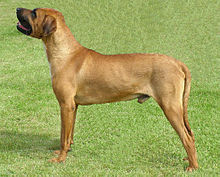Tosa (dog)
 |
||||||||||||||||||
| Other names | Tosa Inu Tosa Ken Tosa Tōken Japanese Fighting Dog Japanese Mastiff Tosa Fighting Dog Japanese Tosa |
|||||||||||||||||
|---|---|---|---|---|---|---|---|---|---|---|---|---|---|---|---|---|---|---|
| Origin | Japan | |||||||||||||||||
|
||||||||||||||||||
| Domestic dog (Canis lupus familiaris) | ||||||||||||||||||
| Classification / standards | |||
|---|---|---|---|
| FCI | Group 2, Section 2.1 Molossian: Mastiff type #260 | standard | |
| AKC | |||
| The AKC Foundation Stock Service (FSS) is an optional recording service for purebred dogs that are not yet eligible for AKC registration. | |||
| UKC | Guardian Dog | standard | |
The Tosa (土佐?, also called the Tosa Inu or Japanese Mastiff) is a breed of dog of Japanese origin that is considered rare. It was originally bred in Tosa (present day Kōchi) as a fighting dog and still is today.
The Tosa varies considerably in size, with the Japanese-bred dogs tending to be about half the size of those bred outside the country. The Japanese breed generally weighs between 80 and 135 pounds (36 and 61 kg), while the non-Japanese breeders have focused on dogs that weigh from 130 to 200 lb (60 to 90 kg) and stand 24.5 to 32 inches (62 to 82 cm) at the withers. The coat is characterized by its short and smooth appearance and is often red, brindle, or fawn. Occasionally it can be a dull black, but this is somewhat rare. Maintenance of the coat is usually minimal.
This breed originated in the second half of the nineteenth century. The breed started from the native Shikoku-Inu, an indigenous dog weighing about 25 kilograms (45 pounds) and standing about 55 centimetres high, which closely resembles the European Spitz. These dogs were crossed with European dog breeds, such as the Old English Bulldog in 1872, Mastiff in 1874, St. Bernard, German Pointer in 1876, Great Dane in 1924, and the Bull Terrier. The aim was to breed a larger, more powerful dog. The heyday of Tosa breeding was between 1924 and 1933, when it was said that there were more than 5,000 Tosa breeders in Japan.
...
Wikipedia
